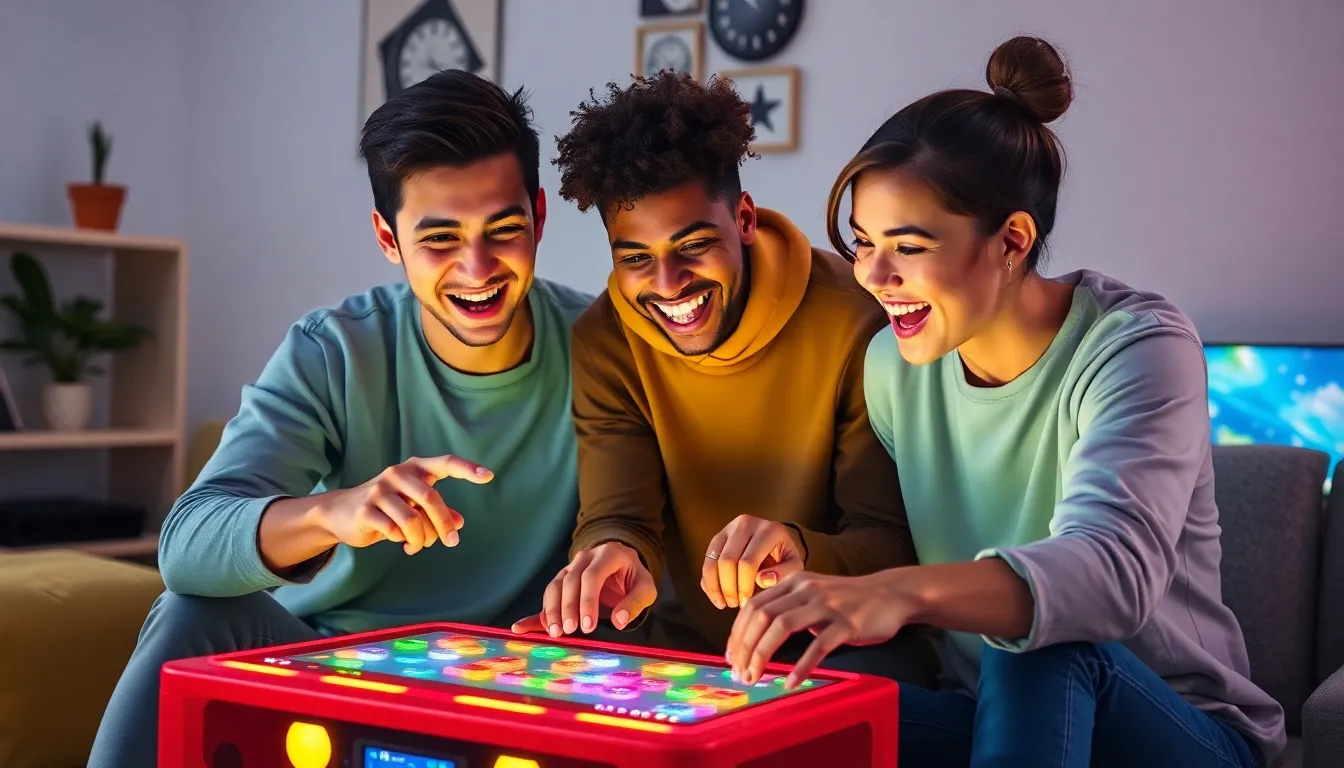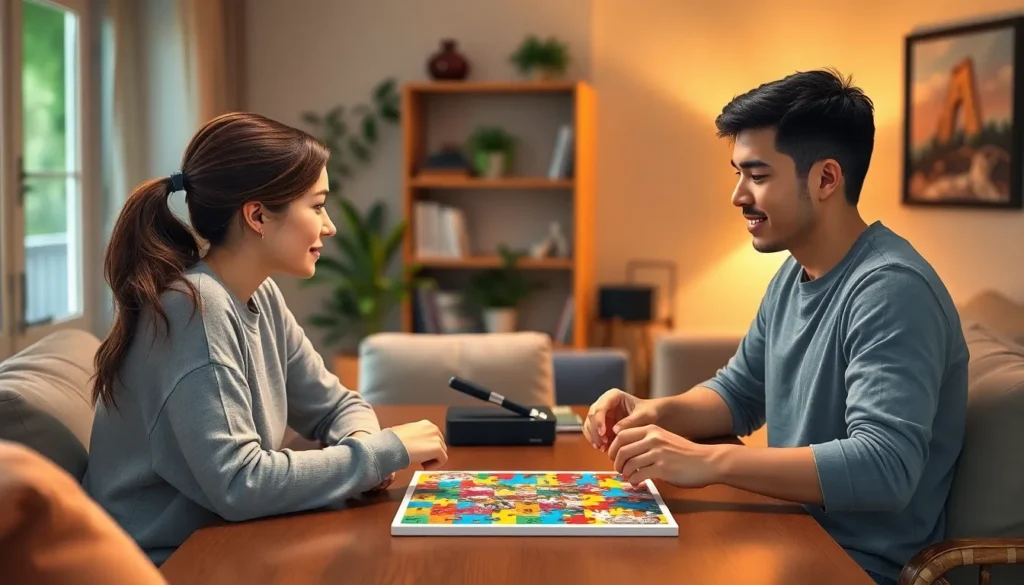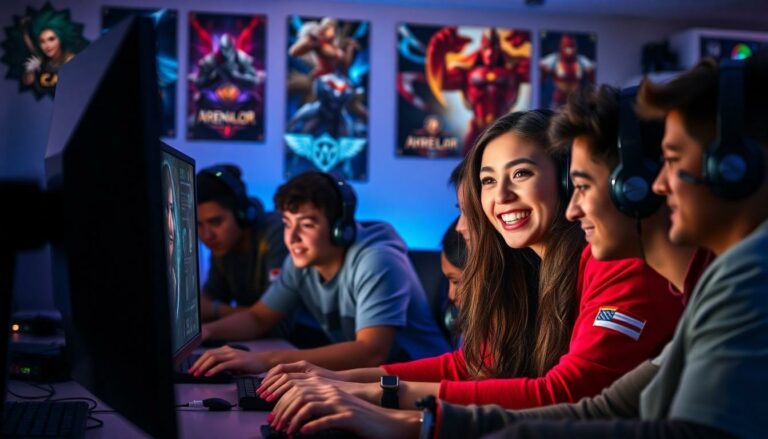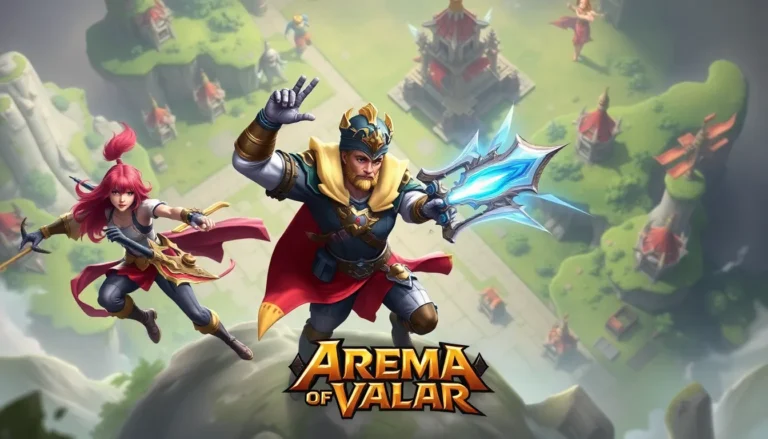Looking for a way to challenge your brain while having a blast with a friend? Two-player puzzle games are the perfect solution! These games not only spark friendly competition but also encourage teamwork, making them a fantastic way to bond. Whether you’re a strategic mastermind or just in it for the laughs, there’s something for everyone.
Table of Contents
ToggleOverview of 2 Player Puzzle Games
Two-player puzzle games serve as an engaging way for players to collaborate or compete. Such games offer diverse mechanics, catering to various preferences and skill levels. Cooperative games emphasize teamwork, requiring players to strategize together to solve challenges. Competitive games, on the other hand, often create a friendly rivalry, pushing players to outsmart each other.
Numerous digital and physical formats exist for these puzzles. Digital platforms include popular mobile apps and computer games, allowing players to connect globally. Board games, such as chess or tic-tac-toe, provide traditional ways for friends to challenge one another face-to-face. Each format enhances the interactive experience, encouraging social connections.
While challenging cognitive skills, these games also promote essential social interactions. Players develop communication skills, learning to express ideas clearly during gameplay. Problem-solving abilities sharpen as they navigate various obstacles, fostering collaboration and critical thinking.
A wide range of themes and genres ensures accessibility for every player. From word puzzles to logic games, options cater to casual gamers and hardcore strategists alike. The flexibility of these games allows groups to adjust rules to fit their preferences or time constraints.
Overall, two-player puzzle games present an enjoyable way to stimulate the mind while building relationships. They bring people together, creating lasting memories through shared experiences and challenges.
Popular Genres

Two-player puzzle games encompass various genres, each offering unique experiences. Understanding these genres enhances gameplay and overall enjoyment.
Cooperative Puzzle Games
Cooperative puzzle games emphasize teamwork. Players must communicate effectively to achieve shared objectives. Titles like “Keep Talking and Nobody Explodes” exemplify this genre. In these games, one player may provide instructions while the other follows. Strategies develop through ongoing dialogue and quick problem-solving. Players experience a sense of accomplishment upon overcoming challenges together. Success hinges on collaboration, making these games ideal for friends seeking bonding experiences.
Competitive Puzzle Games
Competitive puzzle games focus on rivalry. Players face off, striving to outsmart each other within a defined timeframe. Games like “Tetris” and “Puzzle Fighter” highlight this intense competition. Fast-paced play adds urgency, compelling players to think quickly. Strategies can vary greatly, as players adapt to their opponent’s moves. Victory depends on skill and decision-making, creating a thrilling atmosphere. These games engage players seeking a challenge while fostering excitement through friendly competition.
Top 2 Player Puzzle Games
Two-player puzzle games offer an engaging way to challenge friends while enhancing cognitive skills. These games often split into classic titles and modern releases, each providing unique experiences.
Classic Games
Classic games stand the test of time, offering enjoyment through simple yet effective mechanics. “Tetris” remains a favorite with its block-stacking format, encouraging strategic placement. “Jenga” challenges players to carefully remove blocks without topppling the tower and fosters conversation. “Connect Four” engages players in a battle of wits, where they aim to line up four discs in a row. “Operation” tests fine motor skills and quick thinking as players navigate tricky tasks without touching the sides. These timeless games create memorable experiences.
Modern Releases
Recent games capture fresh concepts in the puzzle genre. “Overcooked” blends cooking with teamwork, demanding players collaborate under pressure to create dishes. “Portal 2” introduces players to unique physics-based puzzles, combining cooperation and wit to solve challenges. Titles like “Keep Talking and Nobody Explodes” promote communication, requiring one player to defuse a bomb while others provide instructions from a manual. “The Witness” captivates players with intricate visual puzzles set against a stunning landscape. These modern releases highlight the evolving nature of two-player puzzles, ensuring excitement and interaction.
Benefits of Playing Together
Playing two-player puzzle games fosters teamwork. Players learn to communicate effectively to solve challenges together. Enhanced social interactions lead to stronger friendships and connections. Engaging in cooperative gameplay promotes trust and collaboration, as participants rely on each other’s strengths.
Competitive games also offer unique benefits. They encourage strategic thinking and quick decision-making, where players must outsmart opponents. Excitement rises, creating memorable moments as players engage in friendly rivalry. Winning or losing provides valuable lessons, enhancing overall enjoyment.
Cognitive skills improve through gameplay. Problem-solving and critical thinking abilities sharpen with each challenge. Players often approach puzzles from different angles, facilitating creative thinking. Exposure to various game mechanics broadens skill sets and keeps gameplay engaging.
Accessibility matters, and two-player puzzle games cater to diverse preferences. Options exist for casual players and those seeking a serious challenge. With countless themes and genres available, everyone can find a game that fits their interests.
Flexibility enhances the experience. Many games allow players to adjust rules, making them suitable for all ages and skill levels. Players can tailor challenges, keeping the gameplay fresh and exciting.
Overall, the benefits of playing two-player puzzle games extend beyond mere entertainment. They promote personal growth, strengthen relationships, and provide a fun way to bond through teamwork or competition. These games create lasting memories while stimulating the mind.
Tips for Choosing the Right Game
Consider preferences when selecting a two-player puzzle game. Look at the challenge level and engagement style. Cooperative games, such as “Keep Talking and Nobody Explodes,” require communication, making them ideal for team-oriented players. Competitive options like “Tetris” boost rivalry for those who thrive on confrontation.
Evaluate the players’ skill levels for optimal enjoyment. Newer players may prefer simpler mechanics found in classic games like “Connect Four,” while experienced gamers might seek complex challenges present in modern titles such as “Portal 2.”
Review game duration to match the time available for play. Quick-play games provide short bursts of fun, while longer titles can offer extended sessions of collaboration or competition.
Check the theme and aesthetic appeal. Players often enjoy games that resonate with their interests, whether those are whimsical adventures or immersive puzzles.
Inquire about accessibility. Some games, particularly digital ones, can be played across various devices, enhancing flexibility for players. Traditional board games may also encourage face-to-face interaction, fostering connections.
Read reviews and player feedback. Insights from others can guide choices and help identify games that deliver engaging experiences.
Finally, scout for games that allow rule customization. Adaptable mechanics can enhance enjoyment and ensure all players feel included regardless of skill level. Balancing these factors increases the likelihood of a fun, memorable gaming experience.
Two-player puzzle games offer a unique blend of challenge and connection. They encourage players to think critically while fostering teamwork or friendly competition. Whether opting for classic favorites or modern innovations, these games cater to diverse preferences and skill levels.
The social interactions that arise during gameplay enhance communication skills and strengthen bonds between friends. With their engaging mechanics and customizable rules, two-player puzzle games provide endless entertainment and opportunities for personal growth. Embracing these games can lead to memorable experiences that enrich relationships and stimulate the mind, making them a perfect choice for any gathering.








